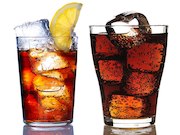
FRIDAY, July 20, 2018 — A new study suggests that colon cancer patients who regularly drink diet sodas have a much lower risk of their tumor coming back, or of dying from the cancer.
In a study funded by the U.S. National Cancer Institute, researchers tracked outcomes for more than 1,000 colon cancer patients. The investigators found that those who drank one or more 12-ounce servings of artificially sweetened soft drinks a day had a 46 percent lower risk of cancer recurrence or death over the study period than those who didn’t drink such beverages.
A second analysis found that about half of the benefit appeared to be due to people switching from regular to diet sodas.
“Artificially sweetened drinks have a checkered reputation in the public because of purported health risks that have never really been documented,” study senior author Dr. Charles Fuchs, director of Yale Cancer Center, said in a university news release.
“Our study clearly shows they help avoid cancer recurrence and death in patients who have been treated for advanced colon cancer, and that is an exciting finding,” he added.
But one expert in colon cancer who reviewed the findings said the study is far from conclusive.
“I would not pay much attention to this observational study with many design flaws,” said Dr. Elena Ivanina, a gastroenterologist at Lenox Hill Hospital in New York City.
Ivanina said colon cancer patients — and consumers generally — should “also weigh all the evidence we have that chronic consumption of artificial sweeteners may increase the risk of obesity and metabolic diseases, which are risk factors for many types of cancers.”
The study was published online July 19 in the journal PLoS One.
Dr. Brendan Guercio is a hospitalist at Brigham and Women’s Hospital in Boston, and first author of the new study. He said in the news release that “a growing body of literature suggests that poor dietary habits, such as high consumption of sugar-sweetened beverages, may increase risk of colon cancer recurrence and patient mortality.”
So, he reasoned, “for colon cancer patients who have trouble abstaining from sweet beverages, choosing artificially sweetened options over sugar-sweetened beverages may allow them to avoid those health ramifications.”
The study was only looking at associations, however, and couldn’t prove that a switch to diet sodas caused the improvement in colon cancer outcomes.
Still, according to Fuchs, the finding “fits in with all that we know about colon cancer risk in general. Factors such as obesity, sedentary lifestyle, a diet linked to diabetes — all of which lead to an excess energy balance — are known risk factors. We now find that, in terms of colon cancer recurrence and survival, use of artificially sweetened drinks is not a health risk, but is, in this study, a healthier choice.”
But Ivanina pointed to what she described as design flaws in the study. First, she said, the researchers relied on patient “self-reports” — people trying to remember soda intake over the past three months, a process that’s notoriously unreliable.
“Most people cannot remember what they ate yesterday, let alone three months ago,” she said.
Ivanina said the study also did not include information on the patient’s pre-diagnosis eating habits, and it did not include people who died or had a cancer recurrence within three months of the first food questionnaire, potentially biasing the results.
Finally, the research team also failed to adjust for other colon cancer risk factors, such as smoking or consumption of red meat, Ivanina said.
Dr. David Bernstein is a gastroenterologist at Northwell Health in Manhasset, N.Y. He agreed with Ivanina that more and better research should be done.
“This is the first of its kind to report such results and therefore the excitement behind it must be also be accompanied by skepticism until the results can be replicated,” he said.
More information
The U.S. National Cancer Institute has more on colon cancer.
Posted: July 2018
Source: Read Full Article